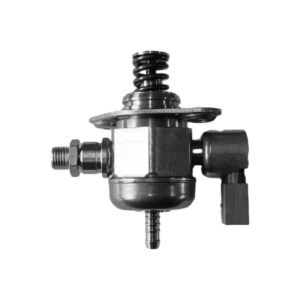-

| Parameter |
Description |
| Maximum Output Pressure |
50 – 200 bar (Model dependent) |
| Fuel Flow Rate |
Typically 30 – 200 liters/hour (varies by engine size and application) |
| Drive Type |
Camshaft-driven or Electric motor-driven |
| Operating Voltage |
12V (Passenger Cars), 24V (Commercial Trucks) |
| Fuel Compatibility |
Gasoline, E10, E85, and other ethanol blends |
| Inlet/Outlet Connection |
Quick-connect or threaded type, based on OEM design |
| Material Construction |
High-strength alloy housing, stainless steel internal components |
| Corrosion Resistance |
Designed to withstand ethanol and moisture exposure |
| Dimensions |
OE-matched for exact fit and direct replacement |
| Mounting Configuration |
Bolt pattern and angle aligned with original manufacturer specifications |
| Application Range |
Passenger vehicles and light to heavy-duty commercial vehicles |
-

The high-pressure fuel pump is a crucial component in modern direct fuel injection systems, responsible for delivering fuel at high pressures to the engine’s injectors. It ensures precise fuel metering, optimal atomization, and efficient combustion, which results in better engine performance, improved fuel economy, and reduced emissions.
-

| Parameter |
Description |
| Maximum Output Pressure |
50 – 200 bar (Model dependent) |
| Fuel Flow Rate |
Typically 30 – 200 liters/hour (varies by engine size and application) |
| Operating Voltage |
12V (Passenger Cars), 24V (Commercial Trucks) |
| Fuel Compatibility |
Gasoline, E10, E85, and other ethanol blends |
| Inlet/Outlet Connection |
Quick-connect or threaded type, based on OEM design |
| Material Construction |
High-strength alloy housing, stainless steel internal components |
| Corrosion Resistance |
Designed to withstand ethanol and moisture exposure |
| Mounting Configuration |
Bolt pattern and angle aligned with original manufacturer specifications |
-

The high-pressure fuel pump is a crucial component in modern direct fuel injection systems, responsible for delivering fuel at high pressures to the engine’s injectors. It ensures precise fuel metering, optimal atomization, and efficient combustion, which results in better engine performance, improved fuel economy, and reduced emissions.
-

The high-pressure fuel pump is a crucial component in modern direct fuel injection systems, responsible for delivering fuel at high pressures to the engine’s injectors. It ensures precise fuel metering, optimal atomization, and efficient combustion, which results in better engine performance, improved fuel economy, and reduced emissions.





